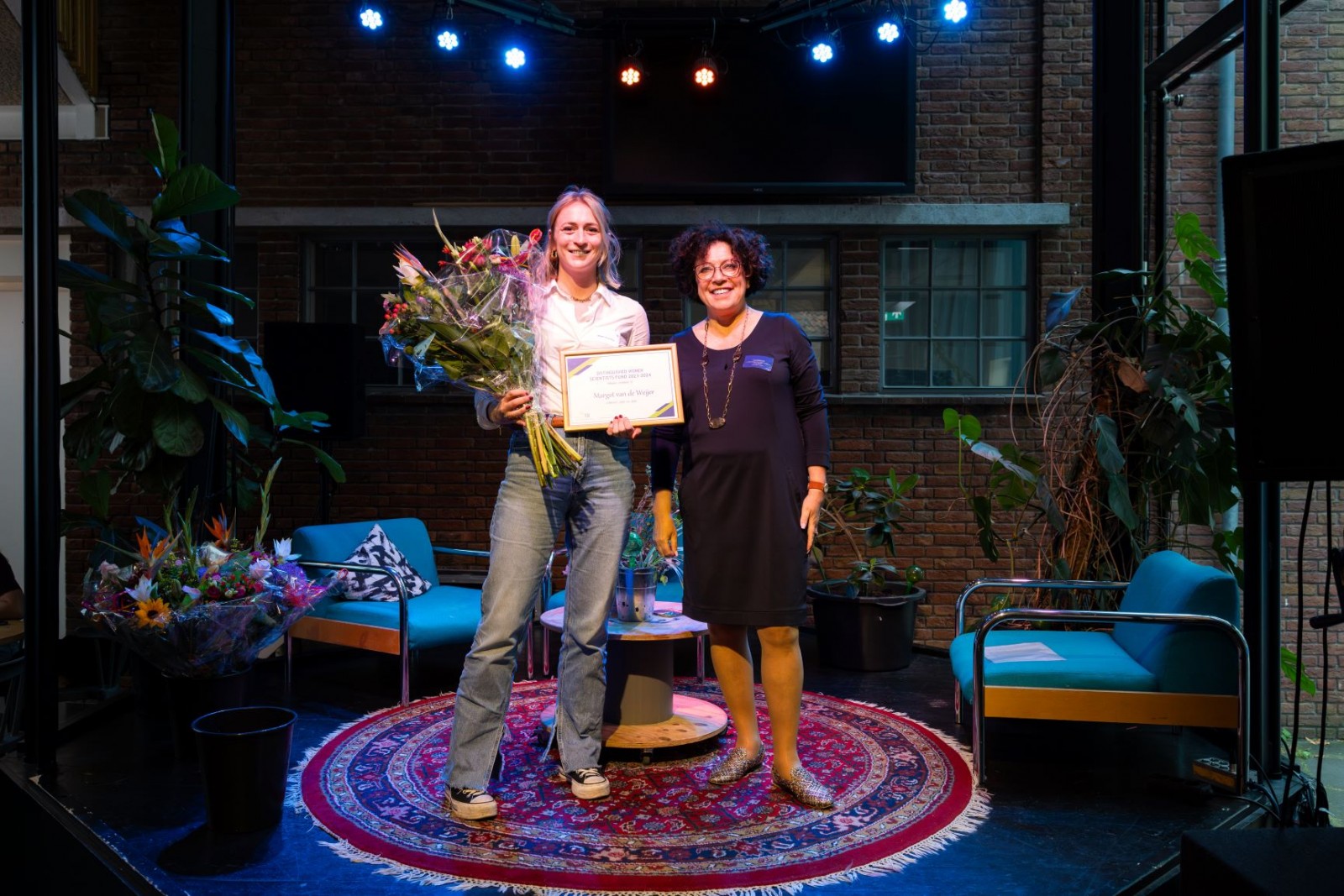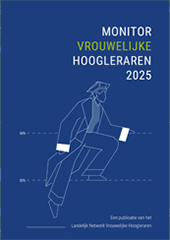DWSF Laureates 2023-2024
The LNVH board and bureau are pleased to announce the 2023-2024 Distinguished Women Scientists Fund laureates. This year the following 7 laureates will receive the DWSF travel grant:
Rocio Arreguín Campos is a postdoctoral researcher at the Faculty of Science and Engineering at Maastricht University. During her doctorate, she worked with detection technologies for the accurate and on-site sensing of bacteria and its application in food safety. She is now working on a new research line that will focus on the development of synthetic receptors for the detection of the parasite that causes malaria. With the DWSF travel grant she will visit the Parasitology department at the Federal University of Minas Gerais in Brazil. This Brazilian-Dutch collaboration aims to develop the first thermal biomimetic sensor for the Point-of-care (PoC) detection of malaria. Learn more about Rocio's research in
Aranka Viviënne Ballering is a post-doctoral researcher at the Department of Psychiatry of the University Medical Center Groningen. She recently started establishing her own intersectional research line focusing on stigmatization towards people with persistent somatic symptoms (PSS). PSS are symptoms for which often no organic cause can be found after adequate diagnostics. It is known that symptoms are differently perceived in women and men, but also by women and men. With the DWSF travel grant, she will visit a sociological research group at Ghent University to study sex and gender differences in stigmatization (i.e. stereotyping and prejudicing) towards people with PSS via an experimental vignette design. Learn more about Aranka's research in.
Lotte van Burgsteden is Assistant Professor of Language and Communication at VU Amsterdam. She focuses on the real-life establishment of dialogue in contested and polarized settings. Amidst growing societal polarization, she wants to further explore how dialogue can foster depolarization. She employs the unique method of conversation analysis and other qualitative methods (interviews, focus groups) to investigate interaction. With the DWSF travel grant she will visit Prof. Geoffrey Raymond, a well-known scholar in the fields of sociology and conversation analysis in Santa Barbara, California to work on a collaborative research project on polarization in political debates and journalism. Learn more about Lotte's research in her introductory video.
Lilith Lee is an Assistant Professor at the Faculty of Humanities with a specialty in the History of Philosophy at VU Amsterdam. With the DWSF travel grant she will visit fin-de-siècle archival collections pertaining to Anglo-Chinese reformer-philosophers Dr LIM Boon Keng and TAN Teck Soon, the only ‘Asiatic’ members of the Straits Philosophical Society (1893–c.1921) in Singapore (then: British Straits Settlements). Lee’s research concerns reconstructing their philosophies and their significances within the (anti-)colonial, inter-imperial, and world-philosophical practices of their day—such as the 1911 First Universal Races Congress, their fueling of Confucian revivalism in British and Dutch colonies, and interactions with South Asian & Anglo-American Idealist intelligentsia then. She will visit multiple archives in Singapore in preparation of an anthology centering LIM & TAN’s philosophies and will present her research at the XXV World Congress of Philosophy (Rome, Aug 2024).
Sangita Swapnasrita is a chemical engineer working as a postdoctoral researcher at the Faculty of Health, Medicine and Life Sciences (Cell Biology Inspired Tissue Engineering Department) at Maastricht University. She has a background in computational modelling of kidney toxin transport and kidney-assist devices and is working on a project to develop an integrated patient and device computational model. With the DWSF travel grant she will visit the lab of professor Joanna Stachowska-Pietka at the Polish Academy of Sciences in Warsaw, whose expertise in computational peritoneal dialysis revolves around advanced computational methods in the field of biomedical engineering, particularly peritoneal dialysis (PD). The research visit would enable integrating knowledge of modelling solute kinetics in different patients and dialysis modes with Sangita’s expertise in transport equations and modelling. Learn more about Sangita's research in her introductory video.
Bárbara Varassi Pega completed her PhD at the Academy of Creative and Performing Arts at Leiden University, as part of the docARTES program. She now works as an artistic research coach in the Master of Music at Codarts University of the Arts, Rotterdam, where she also coordinates the Tango (World Music) Department and teaches piano and ensemble. She also holds an artistic research coach position in the Master of Music at Fontys University of Fine and Performing Arts, Tilburg, the Netherlands, where she is finishing up on a research project on water, climate change and artistic creation. She will use the DWSF travel grant to visit the Universidad Nacional de La Plata in Argentina. The overarching goal of her upcoming post-doctoral research project is to catalyze artistic research and cultural exchange, fostering international collaboration between Codarts University of the Arts in Rotterdam, the Netherlands, and Universidad Nacional de La Plata (UNLP), in Argentina. At the heart of this initiative is the creative practice of River Plate tango music, spanning its performance, arrangement, composition, and artistic research. Specifically centered on advancing the curriculum at both institutions, it positions Codarts' World Music – Tango – Department as a unique hub for formal education in world music. Conversely, Argentina stands as the birthplace of tango music, hosting a rich pool of accomplished musicians actively shaping the contemporary music scene. Their innovative approaches to arranging, composing, and performing tango music serve as a valuable source for the Netherlands and Codarts, providing inspiration and exemplary practices. Learn more about Barbara's research in her introductory video.
Margot van de Weijer is a an assistant professor at Amsterdam UMC. Her work is focused on examining the comorbidity between substance use and psychiatric disorders. Specifically, she investigates why, how, and when substance use (e.g., smoking, alcohol use) may causally lead to psychiatric outcomes (e.g., depression, schizophrenia), and vice versa. Essential to answering these questions is the use of several methods that allow us to, under certain assumptions, examine causality. A particularly innovative and powerful approach for causal inference that lies at the intersection between epidemiology and genetics is Mendelian Randomization (MR). MR allows researchers to study causal associations between an exposure and outcome by using genetic variants associated with an exposure as instruments in instrumental variable analysis. With the DWSF travel grant Margot will visit the MRC Integrative Epidemiology Unit (IEU) at the University of Bristol that lies at the heart of MR advancement and set op collaborations with MR experts. She will also attend the International Conference on Mendelian Randomization, a conference that brings together MR researchers from around the globe. Learn more about Margot's research in her introductory video.

Margot van de Weijer and LNVH board member Tanya Bondarouk at the DWSF award ceremony during the LNVH Spring Symposium 2024


